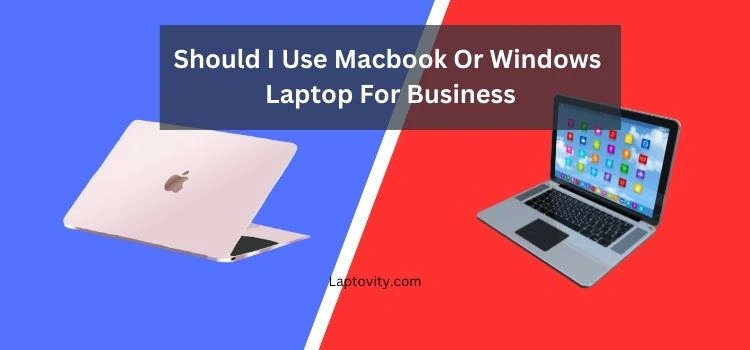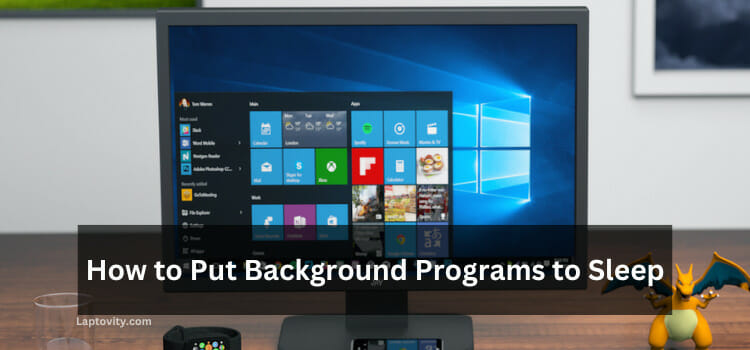Last Updated on August 2, 2025 by Nazim

When choosing a laptop for business, the debate between a MacBook and a Windows laptop often takes center stage. Both computing platforms offer unique benefits and cater to different types of users. As someone deeply invested in laptops, computers, and the latest technology, I understand how challenging this decision can be. In this guide, I’ll help you navigate the key differences, pros, cons, and practical considerations to make the best choice for your business.
Why the Choice Matters
Your laptop is more than just a tool; it’s the backbone of your productivity and efficiency. The decision between a MacBook and a Windows laptop isn’t just about brand loyalty—it’s about ensuring your business gets the right mix of user experience, compatibility, and value.
Both platforms excel in different areas. MacBooks are renowned for their sleek design, seamless hardware and software integration, and optimized performance. On the other hand, Windows laptops provide a wider range of options across price points, making them more accessible to businesses of all sizes. Let’s break it down further.
| Feature | MacBook | Windows Laptop |
|---|---|---|
| Average Cost | Premium pricing; for example, the MacBook Air 15 (2024) starts at $1,299. | Wide range; models like the Asus Zenbook A14 start at $1,099.99, with budget options available. |
| Performance | Equipped with Apple’s M-series processors, offering high performance and energy efficiency. | Varies by model; recent ARM-based PCs with Qualcomm Snapdragon processors offer improved performance. |
| Design and Build Quality | Sleek, minimalist, and durable aluminum designs. | Diverse designs; options range from lightweight ultrabooks to robust workstations. |
| Software Compatibility | Optimized for macOS; ideal for creative and development tools. | Broad compatibility; supports a wide array of business and legacy applications. |
| Battery Life | Excellent battery life; for instance, the MacBook Air 15 (2024) offers up to 12.7 hours. | Varies by model; some ARM-based Windows laptops now offer competitive battery life. |
| Security | Generally considered more secure by design. | Security varies; depends on hardware and software configurations. |
| Manageability | Easier to manage in modern SaaS environments; may require MDM solutions. | Well-established management tools; integrates seamlessly into Active Directory environments. |
| Manufacturers | Exclusively Apple. | Multiple manufacturers, including Dell, HP, Lenovo, Asus, Acer, Microsoft, and more. |
| Operating Systems | macOS (latest version: macOS Sonoma 14.2 as of 2025). | Primarily Windows 11 (latest version as of 2025); some options include Linux pre-installed (e.g., Ubuntu, Fedora). |
| Customization | Limited customization options; you choose from predefined models with fixed hardware specs. | Highly customizable; users can configure hardware specifications, including CPU, RAM, storage, and more. |
MacBook for Business: Is It the Right Fit?
Apple’s MacBooks are often associated with creative work and high-end tasks. They’re especially favored by creative professionals for their reliability, sleek design, and advanced features.
Advantages of Using a MacBook
- Seamless Integration Across Apple Devices
One of the standout features of a MacBook is its seamless integration with other Apple devices. Whether you’re using an iPhone, iPad, or Apple Watch, the ability to sync files, transfer data, and even take calls directly on your MacBook enhances productivity.
Example: Imagine starting a presentation on your MacBook, then seamlessly picking it up on your iPad during a meeting. - Optimized Hardware and Software
Apple’s control over both the hardware and software ensures that macOS runs efficiently without glitches. This is particularly important for creative professionals who rely on performance-intensive apps like Adobe Photoshop or Final Cut Pro. - Reliability and Longevity
When it comes to reliability, MacBooks are hard to beat. They tend to last longer with fewer hardware failures, which can reduce the total cost of ownership over time. Businesses looking for a device that can perform well for several years might find this appealing. - User-Friendly Operating System
macOS is known for being intuitive and user-friendly, even for those who aren’t tech-savvy. For business owners focused on simplicity and security, macOS’s built-in safeguards are a significant plus. - Aesthetic Appeal
Let’s face it—MacBooks are beautiful. Their sleek design can add a touch of professionalism and style to your workspace, which might even leave a good impression during meetings or presentations.
Challenges of Using a MacBook
- High Price Points
A MacBook’s price tag is often one of its biggest downsides. Even the relatively affordable MacBook Air can cost more than a mid-range Windows laptop. This may not suit small businesses with tight budgets. - Limited Software Compatibility
While macOS excels in many areas, it falls short when it comes to certain niche business applications. For example, some financial, engineering, or custom enterprise tools are only available on Windows. - Device Management for Teams
If your business operates in a mixed environment of Windows and macOS systems, managing multiple platforms can complicate device management.
Windows Laptop for Business: Is It Better for You?
Windows laptops dominate the business world, offering a vast array of choices. Whether you’re a startup owner or part of a large enterprise, Windows laptops provide versatility and compatibility unmatched by any other platform.
Advantages of Using a Windows Laptop
- Wide Range of Choices
Windows laptops come in a wider range of models, configurations, and price points, making them accessible to everyone—from freelancers to large corporations. You can find laptops for as little as $300 or premium machines exceeding $2,000. - Compatibility with Business Software
The Windows operating system supports virtually every major business application, including Microsoft Office, AutoCAD, and proprietary enterprise tools. This makes it the default choice for industries like engineering, finance, and data analytics. - Customizable Hardware
Many Windows laptops allow you to upgrade components like RAM, storage, and even GPUs. This flexibility can be invaluable for businesses that need specific configurations. - Robust Device Management
Windows laptops excel in enterprise settings, where tools like Active Directory and Intune streamline device management for IT administrators. This makes them ideal for larger organizations. - Price Flexibility
Windows laptops cater to a broader audience with their varied price points, from budget-friendly options to high-performance models like Dell XPS or HP Spectre.
Challenges of Using a Windows Laptop
- Inconsistent User Experience
The quality of a Windows laptop heavily depends on the manufacturer. A high-end model from Lenovo or Dell will outperform a low-cost option from lesser-known brands, which can result in an uneven user experience. - Security Concerns
Despite Microsoft’s efforts, Windows systems are more prone to malware and viruses than macOS. Businesses handling sensitive data may need additional security tools. - Shorter Lifespan for Low-End Models
Cheaper Windows laptops often have a shorter lifespan, leading to higher maintenance and replacement costs.
Key Considerations: MacBook vs. Windows Laptop
When deciding between a MacBook and a Windows laptop, focus on these key factors:
1. Business Needs
- If your business involves creative work, like graphic design or video editing, a MacBook might be the better option.
- For general office work, programming, or industries requiring niche software, a Windows laptop is likely a better fit.
2. Budget
- If you have a flexible budget, the sleek design and longevity of a MacBook may justify the cost.
- For budget-conscious buyers, Windows laptops offer a better balance of price and performance.
3. Ecosystem Integration
- A MacBook is ideal if your workflow already includes other Apple devices, thanks to seamless integration.
- Windows laptops are better for businesses with mixed platforms or enterprise environments.
4. Scalability
- Windows laptops are better suited for large teams due to their compatibility with enterprise device management tools.
- MacBooks work well for small teams or individuals.
Conclusion: Which Laptop Should You Choose?
Choosing between a MacBook and a Windows laptop ultimately depends on your business needs. If you prioritize user-friendly design, seamless Apple product integration, and reliability, a MacBook is an excellent investment. On the other hand, if your business values software compatibility, device management, and a diverse range of options, a Windows laptop is the clear winner.
Evaluate your budget, the tools you need, and the ecosystem you operate in before making your decision. Either way, both platforms can help you stay productive and competitive in your business journey.
Frequently Asked Questions
Should I choose a MacBook or Windows laptop for a creative business?
If your business focuses on creative work like video editing or graphic design, a MacBook offers better tools, user experience, and optimized hardware and software.
Are Windows laptops more affordable?
Yes, Windows laptops are available across a wider range of price points, making them a cost-effective solution for most businesses.
Can I run Windows on a MacBook?
Yes, you can use tools like Boot Camp or virtualization software to run Windows on a MacBook. However, it’s not a perfect solution and may reduce performance.
Which laptop lasts longer: MacBook or Windows?
MacBooks generally have a longer lifespan due to their premium build quality and optimized performance. However, high-end Windows laptops can also last for years with proper care.
Is security better on a MacBook?
Yes, macOS is generally more secure out of the box. However, businesses using Windows laptops can enhance security with proper tools and practices.

Nazim is a tech enthusiast and expert in laptops, computers, and cutting-edge technology. With a degree in Computer Engineering and experience as a Data Analyst, Nazim combines deep technical knowledge with real-world insights to help readers make informed decisions about their tech needs.


